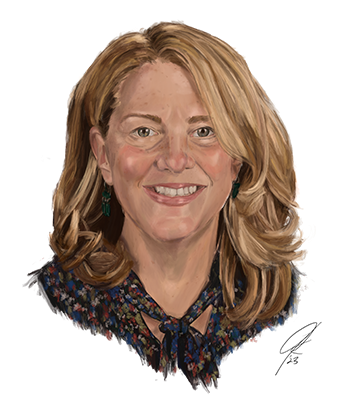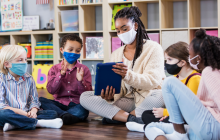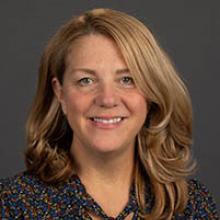Meet the Expert: Susan Therriault

Susan Therriault is an education researcher whose work straddles equity, K-12 school improvement, and policy. Her most recent projects bring together research and practice around the ongoing effects of COVID-19 on educational outcomes. In addition to her work at AIR, she also serves as a member at-large of the Massachusetts School and District Accountability and Support Advisory Board.
POSITION: Institute Fellow
AREAS OF EXPERTISE: State systems of support, college and career readiness, early warning systems
YEARS OF EXPERIENCE: 25
Q: What piqued your interest in a career in education policy and equity in student achievement?
Susan: Growing up, schools were baked into my world. My mom was a teacher, and my grandparents were cafeteria workers and janitors in schools for their entire careers, so I was always very cognizant of how schools worked. Also, I’m an Air Force brat, so I experienced a lot of different schools and school systems. All of that made me very aware of differences in the quality of education that people received, depending on where they lived. My family instilled in me the idea that education is a lever to empower people, and I was really interested in learning about what kind of policies could create a more equitable system.
Q: You currently lead two projects: the PreK-12 RESTART Network and COVID-19 Equity in Education project. What are the goals of these projects?
Susan: The COVID-19 Equity in Education project, which is funded by the Gates Foundation, focuses on building a field of evidence around pandemics, and how they impact K-12 education in general. The PreK-12 RESTART Network, which is funded by the U.S. Department of Education’s Institute of Education Sciences, focuses on the more immediate future, around students who were impacted by COVID-19 specifically. Both projects identify evidence-based strategies that can support accelerated learning and academic achievement, especially for students who are experiencing poverty, as well as Black and Brown students.
Research on strategies and policies during the pandemic is challenging, because the pandemic caused so much disruption and fragmentation. Across the country, there were major differences in how policies rolled out, how local communities reacted, and what kinds of supports students and staff did or didn’t receive. But on top of that, the related research was also very fragmented, because researchers operated in isolation. These two projects are complementary; they both aim to bring together the research communities, so that we can speak with a clear and audience-accessible voice about how to interpret the research and share consensus-driven recommendations that can help guide policymakers.
Q: How does this education research fit in with other aspects of people’s lives—for instance, health care or housing?
Susan: We’ve always understood that none of these systems work in isolation; they’re deeply entwined with one another. But the pandemic really highlighted the intersection of health, education, and public welfare. In the best-case scenarios, these wide-ranging problems resulted in fabulous, cross-sector community partnerships.
Experts strongly believe that we will encounter another pandemic in our lifetime. We’re trying to get ahead of that by building out the body of evidence around what it’s like to learn through a pandemic.
With that in mind, we’re trying to take these projects both broad and deep. In terms of thinking broadly, the COVID-19 Equity in Education database includes not only education data, but also social determinants of health data like housing and the federal COVID-19 pandemic funding allotments for states and districts (from sources like the American Rescue Plan and Elementary and Secondary School Emergency Relief Fund). This allows researchers to look across communities and across sectors to understand, for example, how COVID deaths may have impacted a certain community in different ways.
We’re also trying to go deep: We’ve identified a set of eight localities, across four different states, that are actively rethinking their education systems, with the goal of improving both equality of opportunity and equality of outcome. We have connected them into a researcher-practitioner partnership network. They work in their own individual communities to conduct research, understand challenges, and make recommendations to rethink their systems focusing on equity. On top of that, these communities of researchers also support one another, sharing best practices and resources within the network.
Q: What are the major challenges associated with this work?
Susan: Until now, our education system had never been through a worldwide pandemic. While there are evidence-based strategies that had been studied and shown to have an impact before COVID-19, it’s unclear if this is still the case in the post-pandemic context. Our world has changed a lot, and it’s entirely possible that these strategies would need to change accordingly.
With the pandemic, there’s this constant need to play catch-up. We always know that there’s great need, but we’re always a few steps behind. It’s not easy to anticipate specific needs, because we don’t know how the situation will evolve. In the meantime, there’s almost no opportunity for school staff to take a beat and reflect holistically about what’s happened. Now that schools have moved toward some new version of “normal,” we’re trying to create a dialogue between practitioners and researchers, so that our research is as useful as possible for them.
Q: How are these projects creating opportunities for diverse voices in education research?
Susan: A key element for both projects is to engage emerging researchers, as well as researchers who bring in diverse perspectives. Unfortunately, right now in the education policy space, there is not a lot of diversity among the researchers themselves. We are actively trying to bring new voices to our work, as well as empower people who don’t necessarily think of themselves as researchers.
We are actively trying to bring new voices to our work, as well as empower people who don’t necessarily think of themselves as researchers.
We’ve created an online community where we share resources and connect emerging researchers with peers, experts, and possible mentors, to help build their capacity. We’re also funding them through AIR Equity Initiative mini grants, focused on researchers working in communities serving Black, Brown, and homeless students.
Experts strongly believe that we will encounter another pandemic in our lifetime. We’re trying to get ahead of that by building out the body of evidence around what it’s like to learn through a pandemic. That’s another reason for the push to engage new researchers and increase capacity on this topic—we’re creating the foundation blocks for this field.
Q: Both projects engage policymakers and educators from across the country. Are there logistical challenges to having so many stakeholders?
Susan: It is very challenging to engage that range of stakeholders. We’re using some traditional methods, like connecting to educational associations. But that doesn’t necessarily capture all voices, so we’re also scanning for local events and attending them. We hope that our efforts to meet people where they are will give us a more nuanced understanding of their needs.
We do conduct surveys as well, asking community members what they need. But we’re trying very hard to lessen the burden that we place on them, because they’re so busy; participating in surveys is not their priority. By now, they’ve all been asked what they need many times; they’re sick of it. We’re trying to be creative in how we use extant data, and observational information, to limit that burden.
Q: Where can we find you on a typical Saturday?
Susan: I’m probably walking my dog in the woods, or on the beach. I’m also hanging out with my teenage son, when he’ll hang out with me.
Q: What book would you recommend to anyone?
Susan: My favorite book in this field is Trust in Schools by Anthony Bryk and Barbara Schneider. For lighter reading, I love The Corrections by Jonathan Franzen.


